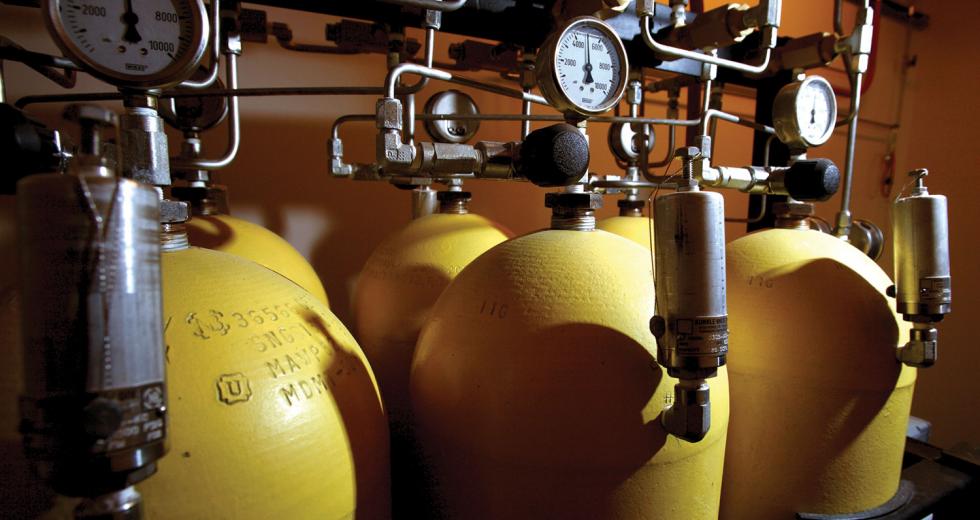The walls are freshly painted. Fashionable new light fixtures hang from the ceiling. It’s got the right zip code, the right floor plan, the right price. Think you’re ready to buy that commercial property? Unless you have peered behind those walls and assessed all that’s happening above those lights, fire protection experts say you shouldn’t sign on the dotted line.
“It’s important that people looking to purchase real estate pay close attention to the fire system that is installed because it can mean major costs if you need to upgrade, says Don Gordon, CEO and co-founder of Pro-Tech Industries, a Sacramento company providing design/build services for fire protection systems.
“Make sure that, if you are buying a building, everything has been maintained. Especially with local budgets and fire departments scaling down, if your pumps are antiquated, you can be looking at some pretty expensive repairs.”
It is the responsibility of the owner or tenant to know the fire code, and that code can be difficult to access and sort through, so if questions arise, contact the city’s building department for further clarification. There are codes not only for different types of properties, but also for the activities happening within them. A warehouse used for floor-to-ceiling storage, for example, will require a different protection system than that same warehouse being used as an auto body shop.
“You need to know the requirements for the space you are seeking, and be sure that the business you want to run in that space is a good fit,” says Ken Kwong, fire prevention officer for the city of Sacramento.
Additionally, cautions Gordon, if the property requires auxiliary fire alarms, think twice about purchasing a proprietary system, which can sometimes cost three times more than a similar generic product.
“If you buy a Mercedes versus buying a Chevy, only the dealership can work on the Mercedes but you can take your Chevy anywhere,” Gordon says. “It works the same with alarm systems. And what do you think they are going to charge you when they come out?”
Gateway Tower in Natomas is the poster property for meeting and exceeding fire code. Fire code for newly constructed high-rises (those above five stories) requires smoke removal systems on every floor to provide air movement under fire conditions. At Gateway Tower, the fire protection system is integrated with the heating, ventilating and air-conditioning system and, in the event of fire, automatically overrides the HVAC system and initiates smoke evacuation.
The fire code for high-rise buildings also now requires fire equipment rooms furnished by the property owner and maintained by the local fire department to be located on every fifth floor. These equipment rooms must include a stash of compressed-air breathing tanks. At Gateway, full tanks are available for firefighters, as â?¨are tank refill stations connected via pipe to a ground-floor air supply room that houses an additional cache.
“There is no reason for the fire department to leave the fire floor until the fire is extinguished, everyone has been evacuated or it’s determined that the fire is too great,” says Brian Clary, Gateway’s chief engineer.
The benefit of being in a high-rise building is quite advantageous in regards to safety. Today these buildings are constructed to allow a minimum of two hours of safety in the stairwells, including vestibules for persons with disabilities.
Property developers and owners looking for the latest and greatest in fire protection systems can choose to add additional safety systems, such as a carbon dioxide evacuation system, but “we only enforce the minimum because what we ask for is very expensive,” says Stockton Fire Marshal Matt Duaime.
If you’re purchasing an old property, for example a building constructed as a nightclub in the 1970s, and you are planning on continuing to use that property for its original purpose, it’s likely the property will not require fire system upgrades as a result of the purchase.
However, grandfathering an existing property into antiquated fire code only works if you are swapping apples for apples. If the property you are purchasing once held a widget-manufacturing company, but you are a widget wholesaler, you could be looking at a problem.
“If you change the occupancy or classification, some jurisdictions will impose new classifications for the sprinkler system; they might also make you do that if you are undertaking a major remodel,” Gordon says.
Be sure to speak to the local building department for specific rules and requirements. Potential buyers would also be prudent to request the building documents as well, Kwong says. The drawback is that those requests can â?¨take up to 10 business days to process, but the information they provide could save the buyer thousands of dollars down the road.
For that reason, buyers should also ask to see the maintenance records for the fire protection system. Systems that haven’t been maintained might need repair and might not meet code.
Lastly, have a long conversation with your insurance provider.
“You have code-driven issues mandated by law, but the biggest driver in our industry is insurance requirements because those are even more restrictive,” Gordon says. “Older buildings are grandfathered into laws, but the insurance company isn’t going to grandfather them in. We have a huge customer with a warehouse in Sparks, Nev. — Amazon — and they are having to go through insurance upgrades. If you don’t do what they ask you to do, then your rates go up.”
Recommended For You

Fire Stomper
Aero Union Corp. moves headquarters to McClellan
Last year the nation watched as images of weary firefighters battling a massive inferno in the Angeles National Forest blazed across their TV screens. After starting on Aug. 26, 2009, the Station Fire went on to burn 160,577 acres, injure 22 people and kill two firefighters before it was fully contained nearly two months later.
Act Right
How to comply with the ADA
If you own, operate, lease or lease to a business that serves the public, the Americans with Disabilities Act applies to you, and you are legally obligated to follow its facility-access guidelines. Here are tips for becoming compliant, protecting yourself against a complaint or lawsuit and getting all the business you can through your doors:



